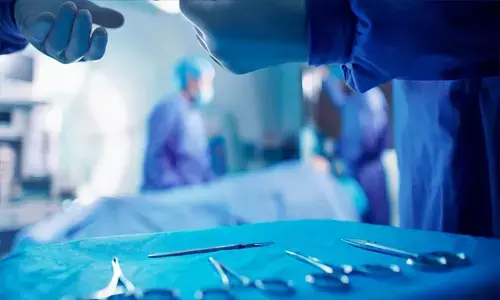- Home
- Medical news & Guidelines
- Anesthesiology
- Cardiology and CTVS
- Critical Care
- Dentistry
- Dermatology
- Diabetes and Endocrinology
- ENT
- Gastroenterology
- Medicine
- Nephrology
- Neurology
- Obstretics-Gynaecology
- Oncology
- Ophthalmology
- Orthopaedics
- Pediatrics-Neonatology
- Psychiatry
- Pulmonology
- Radiology
- Surgery
- Urology
- Laboratory Medicine
- Diet
- Nursing
- Paramedical
- Physiotherapy
- Health news
- Fact Check
- Bone Health Fact Check
- Brain Health Fact Check
- Cancer Related Fact Check
- Child Care Fact Check
- Dental and oral health fact check
- Diabetes and metabolic health fact check
- Diet and Nutrition Fact Check
- Eye and ENT Care Fact Check
- Fitness fact check
- Gut health fact check
- Heart health fact check
- Kidney health fact check
- Medical education fact check
- Men's health fact check
- Respiratory fact check
- Skin and hair care fact check
- Vaccine and Immunization fact check
- Women's health fact check
- AYUSH
- State News
- Andaman and Nicobar Islands
- Andhra Pradesh
- Arunachal Pradesh
- Assam
- Bihar
- Chandigarh
- Chattisgarh
- Dadra and Nagar Haveli
- Daman and Diu
- Delhi
- Goa
- Gujarat
- Haryana
- Himachal Pradesh
- Jammu & Kashmir
- Jharkhand
- Karnataka
- Kerala
- Ladakh
- Lakshadweep
- Madhya Pradesh
- Maharashtra
- Manipur
- Meghalaya
- Mizoram
- Nagaland
- Odisha
- Puducherry
- Punjab
- Rajasthan
- Sikkim
- Tamil Nadu
- Telangana
- Tripura
- Uttar Pradesh
- Uttrakhand
- West Bengal
- Medical Education
- Industry
Preserving bowel continuity, gold standard of bowel injury treatment: Study

France: Primary repair of intestinal injuries should be the preferred approach in trauma patients, independent of the site of the damage (small bowel or colon). Stoma formation is a significant contributor to postoperative morbidity, which should be balanced against the danger of an intestinal suture or anastomosis, according to research published in the journal BMC Surgery on 8th September 2021.
The treatment of severe bowel injuries is difficult. Although anastomotic or suture leak is still a concern, maintaining intestinal integrity is becoming the preferred technique. The purpose of this research which was conducted by Camille Tantardini and the team was to assess the consequences of such an approach.
Between 2007 and 2017, all patients included received surgery for intestinal traumatic injuries at a high-volume trauma hospital. The postoperative course for abdominal problems, morbidity, and death was examined. The overall severity of the trauma was assessed in two ways: hemodynamic status at the time of admission (patients with a systolic blood pressure less than 90 mmHg or on vasopressors were considered unstable), and severity scores such as the Injury Severity Score (ISS) and the New Injury Severity Score (NISS).
In this study, the factors that most impacted the surgeon's choice were fecal contamination and the transfusion of at least 6 RBC units during the first 24 hours. Finally, for small bowel injuries, the percentage of primary repair or anastomosis was 87 percent, and for colon injuries, the rate was 81 percent. Fistulas were seen in just 2.2 percent of patients, with no leakage following colon damage repair.
In conclusion, when treating intestinal trauma, regardless of the site of injury, bowel continuity should be preserved as much as feasible. Anastomoses and sutures are generally safe, with a fistula rate of 2.2 percent. Stoma formation is a significant contributor to postoperative morbidity, and it should be balanced against the potential risk of anastomosis leaking.
Reference:
Tantardini, C., Godiris-Petit, G., Noullet, S. et al. Management of the injured bowel: preserving bowel continuity as a gold standard. BMC Surg 21, 339 (2021). https://doi.org/10.1186/s12893-021-01332-x
Medical Dialogues consists of a team of passionate medical/scientific writers, led by doctors and healthcare researchers. Our team efforts to bring you updated and timely news about the important happenings of the medical and healthcare sector. Our editorial team can be reached at editorial@medicaldialogues.in.
Dr Kamal Kant Kohli-MBBS, DTCD- a chest specialist with more than 30 years of practice and a flair for writing clinical articles, Dr Kamal Kant Kohli joined Medical Dialogues as a Chief Editor of Medical News. Besides writing articles, as an editor, he proofreads and verifies all the medical content published on Medical Dialogues including those coming from journals, studies,medical conferences,guidelines etc. Email: drkohli@medicaldialogues.in. Contact no. 011-43720751


